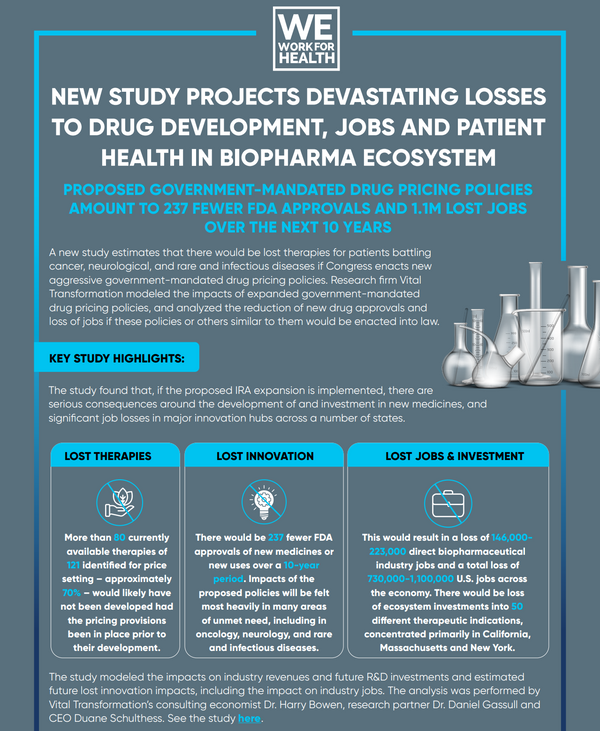FOR IMMEDIATE RELEASE
SALT LAKE CITY, July 27, 2023 – Proposed expansions of federal government-mandated drug pricing policies present serious consequences for the development of and investment in new medicines, and significant job losses in major innovation hubs such as Utah, according to a new, in-depth study.
The study, jointly released by We Work for Health and Vital Transformation, offers a state-by-state picture of the economic impact of new proposals that would allow Medicare to set prices for specific drugs five years after FDA approval. These proposals are included in the Executive Branch’s FY 2024 budget as well as the U.S. Senate’s SMART Prices Act.
The study estimates the loss of up to 23,000 jobs in Utah over the next decade with more than a one million jobs lost nationwide. Salt Lake City is currently ranked one of the top 25 cities in the country with the largest employment levels in drugs and pharmaceuticals. Utah companies are pioneering new treatments and cures for some of the world’s most challenging diseases, including cancer, Alzheimer's, ALS, MS and more.
The study also finds that these drug pricing plans will result in 235 fewer medicines reaching patients, including in Utah, in the next 10 years. Impacts will be felt most heavily in many areas of unmet need, such as rare disease, oncology, neurology and infectious disease.
“Utah’s life sciences industry has been the fastest growing in the nation since 2012,” said Kelvyn Cullimore, president and CEO of BioUtah. “These proposed government price-setting policies are overreaching and put investment in innovative medicines at risk while stifling economic activity in a strategic sector of our state. The study raises alarm bells that are cause for concern.”
“At a time when the biopharmaceutical industry is just beginning to experience the negative impacts of the Inflation Reduction Act’s government-mandated drug pricing policy, any new proposal only adds fuel to the fire and reinforces a deeply misguided and flawed approach,” said Tom Kowalski, national co-chair of We Work For Health, a national organization that collaborates with biopharmaceutical research companies, as well as patient advocacy organizations, to improve the health and well-being of patients.

In General: The price-setting plans would lead to significant lost therapies, innovation and jobs in the biopharmaceutical ecosystem at an accelerated pace.
Lost Therapies: More than 80 currently available therapies of 121 identified for price-setting, approximately 70 percent, would likely not have been developed had these pricing provisions been in place prior to their development.
Lost Innovation: More than 235 fewer FDA approvals of new medicines or new uses over a 10-year period. Impacts of the proposed policies will be felt most heavily in many areas of unmet need, particularly in oncology, neurology and rare and infectious diseases.
Lost Jobs: Loss of up to 3,401 direct biopharmaceutical industry jobs and up to a total loss of 23,594 jobs in Utah.
The analysis in the new study was performed by Vital Transformation’s consulting economist Dr. Harry Bowen, research manager Dr. Daniel Gassull and CEO Duane Schulthess.
For more information and the full study, please visit Vital Transformation or We Work For Health.

Prior to this new study, Vital Transformation and the Biotechnology Innovation Organization (BIO) had issued a separate study showing that patients could lose access to at least 40 percent of new medicines that wouldn’t be developed as a result of government-mandated drug pricing policies contained in the Inflation Reduction Act (IRA). This equates to as many as 139 therapies not being developed over the next 10 years.
Congress must preserve incentives for small molecule research. Under the IRA, biologics have a 13-year period before the government can intervene and mandate drug prices, but small molecule drugs are limited to nine years prior to negotiation. This discrepancy will lead to a reduction in investment in small molecule drugs.




